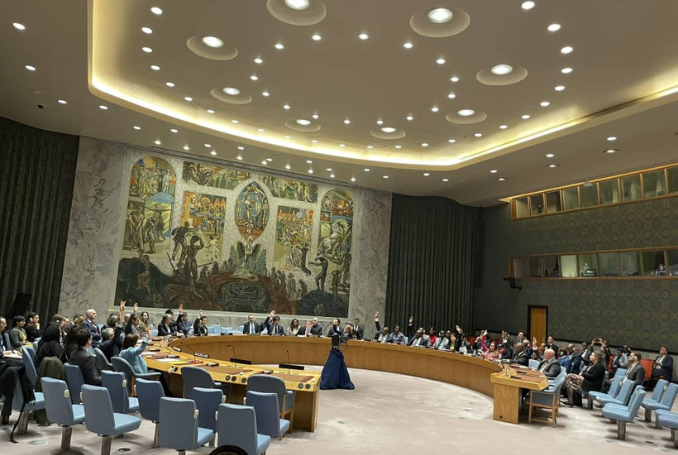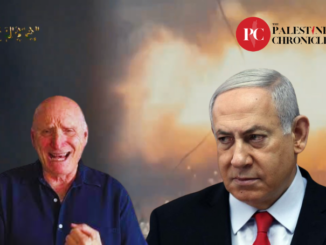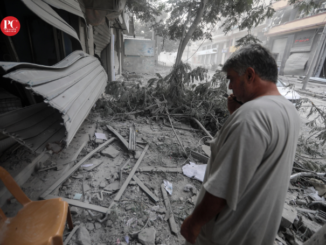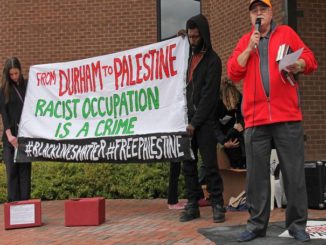
By Palestine Chronicle Editors
The resolution calls for boosting aid deliveries to the besieged Gaza Strip. However, it falls short of enforcing a clear UN aid mechanism.
After several days of delay, the United Nations Security Council passed Resolution 2722, calling for “unhindered delivery of humanitarian assistance at scale directly to the Palestinian civilian population throughout the Gaza Strip”.
Russia’s Ambassador to the United Nations Vassily Nabenzia has accused Washington of “dragging out the negotiating process, deviating from the normal transparent work”.
According to Nabenzia, the US has “resorted to their favored tactic of gross pressure, blackmail, twisting arms, so that at the last minute, they can present the Security Council members with an ultimatum, either the Council adopts a text that is convenient for Washington or the US will block the adoption of any product.”
UNSC: The UN Security Council adopted Resolution 2722 regarding expanding and monitoring humanitarian aid to the Gaza Strip.
The Security Council refrained from making an amendment requested by Russia to the draft resolution due to the American veto. pic.twitter.com/JQ5vjqtuB7
— The Palestine Chronicle (@PalestineChron) December 22, 2023
What Does Resolution 2722 Call For?
The resolution calls for boosting aid deliveries to the besieged Gaza Strip.
However, it falls short of enforcing a clear UN aid mechanism. Additionally, it does not call for a ceasefire.
Who Introduced the Draft Resolution?
The draft was sponsored by the United Arab Emirates. It passed after a negotiation period that lasted for five days.
The resolution’s two main points rejected by the US are its original call for “cessation of hostilities” and a call for a UN aid monitoring mechanism.
The latest draft of the resolution, however, had removed the following passage: “urgent and sustainable cessation of hostilities”.
What Does the New Resolution Call for?
Stripped from its original intentions of ending the war, and giving the UN control over monitoring the delivery of aid amid outright famine in Gaza, the new draft calls for “urgent steps to immediately allow safe and unhindered humanitarian access (to Gaza)”.
A draft UNSC resolution on a Gaza ceasefire was postponed, as the Israeli government continues to refuse a Hamas demand for a comprehensive ceasefire. https://t.co/XtkAX0TslN pic.twitter.com/PEmq2lFbtY
— The Palestine Chronicle (@PalestineChron) December 22, 2023
Who Voted? Who Abstained?
13 UNSC members voted in favor of the resolution and 0 members voted against it.
However, two countries abstained, though for entirely different reasons.
The US abstained as not to appear critical of Israel in any way, while Russia abstained because it perceived the resolution as “toothless”.
What is the US Saying about the Resolution?
US Ambassador to the UN Linda Thomas-Greenfield was quoted as saying,
“I just want to share with you that we have worked hard and diligently over the course of the past week with the Emiratis, with others, with Egypt, to come up with a resolution that we can support. And we do have that resolution now.”
What is the Context of this Vote?
Since the start of the Israeli war on Gaza, repeated attempts by Russia, China, and other UN members to press for a ceasefire were outright rejected by the US.
The last US rejection took place on December 8, when Washington vetoed a resolution demanding a ceasefire.
Axios reports that the negotiations that preceded the latest vote involved the likes of US Secretary of State Antony Blinken and National Security Advisor Jake Sullivan.
Israel’s war on Gaza is among the deadliest and most destructive in modern history, according to the Associated Press. https://t.co/We0JRGKvTv pic.twitter.com/GKCeVsTVA0
— The Palestine Chronicle (@PalestineChron) December 22, 2023
What Now?
The resolution could be seen in two different ways.
One, since it failed to provide any UN monitoring or clear mechanism on how to implement it, the resolution could indeed represent yet another emasculated UN attempt at preventing the international community from taking any serious action to end the genocide in Gaza.
Two, it could also mean that Washington might be in the early stages of reconsidering its position, which has, from the first day of the war, been in total support of Israel.
Indeed, without US military and political backing, it could be argued that Israel would have lost this war weeks ago.
US Vetoes Brazil Humanitarian Resolution on Gaza: But Why Did Russia Abstain? https://t.co/KDMypWz5UR via @PalestineChron
— Peter Limb (@pclimb) October 19, 2023
An indication that this could indeed be the case is that a resolution, which some UNSC members tried to pass on October 18, was rejected by the US for failing to condemn the Palestinian Resistance Movement Hamas.
The US did not seem keen on this condemnation with Resolution 2722.
Coming days will indicate the political direction of the US administration regarding the war, and whether Washington’s abstention is a reflection of a change of policy or a mere diplomatic compromise.
(The Palestine Chronicle)








Why do you keep peddling Resolutions of Satan???
There is ONE AND ONLY SOLUTION TO STOP HUMAN SUFFERINGS IN OCCUPIED PALESTINE AND ELSEWHERE – but I see it mentioned NOWHERE!!! TOTAL INDIVIDUAL BOYCOTT AS MUCH AS POSSIBLE!!!
BAFS